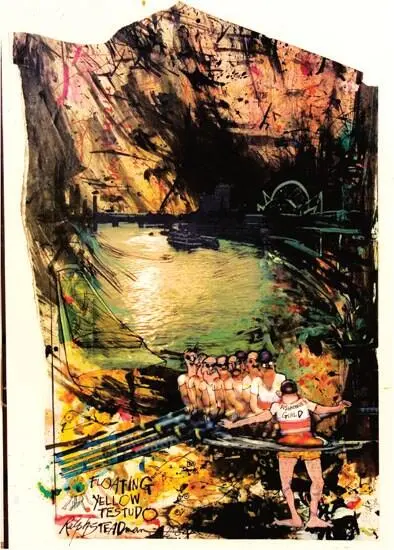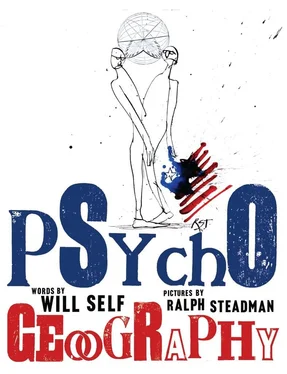I walked over to the scuzzy part of town, between the port and the station, where Naples’s renowned transvestites ply their silicone wares, and Somalians with golf-ball heads and golf-club bodies do strange things with cloned Samsonite luggage. I rode on the subway — amazingly, it was even more minatory than the narrow alleyways of the old town. I visited an estate agent and discovered that if I wanted to move to Naples I could buy most of a sixteenth-century palazzo for half the price of my London gaff. I took the funicular up the steep hill to the Castel Sant’Elmo and wandered the battlements, looking out over the Ribena-dark sea. At night, I went along to the Villa Communale, a dusty strip of park on the seashore, where there were free concerts of Neapolitan music. To my tin ear and jaundiced eye, these seemed like exceedingly well-groomed dogs howling at the bloody full moon of high summer.
In short, I did what I could, and yet Naples utterly eluded me. It was too dense, too impacted, too other, too rich in meaning, and I wasn’t there for 1/100th of the necessary time. The only things I found at all comprehensible were the presepe . These were curious models of idealised scenes — part rustic, part sacerdotal — enacted against backdrops of ruined classical architecture. Most Neapolitan churches have a presepe and a lot of private homes as well. In their glass cases they encapsulate the entire spirit of the place ‘sacrificing the sensible’, as Lévi-Strauss puts it, ‘in favour of the intelligible’.
In Naples there’s an entire street devoted to presepe , little shops with baskets in front of them full of thousands of cherubs, angels, infant Jesuses, saints, demons, Mary Magdalenes, shepherds, &c. As well as the figures you can get the necessary ivy-choked columns and collapsed mangers to place them among. The presepe are so integral to Naples, with their peculiar air of being part magical juju, part baroque decoration, that someone should really make a film based on them.
To the City for the annual Doggett’s Coat and Badge Race. Taking place at the end of July every year since the early eighteenth century, it is the oldest annually contested event in the British sporting calendar. It’s a rowing race for single sculls, and the course is four and a half miles from London Bridge, against the ebb tide, to Cadogan Pier in Chelsea.
Doggett himself was a comedian and manager of Drury Lane Theatre, but since his death the race has been under the auspices of the Fishmongers’ Company. My friend Julian is a Fishmonger and had extended me an invitation to view the race from the Company’s hired boat, followed by a slap-up lunch in their opulent Hall. Of course, he isn’t literally a fishmonger (I don’t believe he even likes fish), because this is a City Livery Company, and while the Fishmongers’ retains more links with the trade than, say, the Goldsmiths’, it is in essence a living fossil; a medieval guild, cemented to the Square Mile like an oyster, through which flows a great current of nutritious pelf.
I suited up, entrained to Bank and then walked down through the back streets to Swan Lane Pier. The City of London is a bit of a nightmare for the psychogeographer; two thousand years of human interaction have worked over this tiny allotment of earth with savage intensity, digging into it, raising it up and covering over the very watercourses. Now, as one of the three global financial centres, the poisoned air of the place ultrasonically whines with the electronic transmission of trillions, while sweaty-shirted clerks suck filter tips beneath the hard haunches of its institutions. Standing under a spreading chestnut tree in Suffolk Lane, just off Cannon Street, I stared into the immaculate interior of a vacant office suite which had been sculpted out of a Queen Anne town house. Its off-white wainscotting was unleant upon, its beige cabling unused. The thought of how much money was represented by these thousand-odd square feet lying idle made my head spin. I walked on.

At the river the boat was loading up with Fishmongers, their wives and children. We were ushered on board by a previous winner of the race, a wizened boy wearing an antique suit of scarlet. The four oarsmen who were to contest this year’s race were already alongside. So low were the decks of their rapier-like sculls that they appeared to be sitting in the choppy water of the Thames, with its sinisterly beautiful bloom of subsurface silt. The Prime Warden’s launch appeared; on board was the Barge Master, wearing a cockade hat and a frogged coat with an epaulette on its right shoulder like a gold platter.
Loudhailers crackled out Cockney information: ‘If yer wanta know anyfing abaht ve oarsmen, ask ve steward an’ eel tell ya.’ Race slips were passed among the champers-supping mongers, the sunlight danced on the water. Sitting here, in the very cockpit of ultra-urbanity, with a scale replica of the Golden Hind moored in the notch of St Katharine’s Dock across the river, and the high stony mundanity of London Bridge soaring overhead, I felt the dangerous tickle of full temporal simultaneity agitate my psyche. Then they were off, rowing hard against the tide.
It’s a measure of the awesome power of this plutocratic oligopoly that all traffic on the river was stopped for the forty-minute duration of the race. In splendid isolation our flotilla proceeded upstream past central London’s burnished landmarks. ‘The race,’ Julian remarked knowledgeably, ‘is effectively decided in the first few minutes.’ And that much was clear; holding the crown of the river, the oarsman in the yellow singlet had immediately pulled ahead, leaving the other competitors floundering. One made for the inside of the bend, past the culture reef of the South Bank Centre; another disappeared behind a refuse barge moored in midstream; the third was so far back that I feared he might be mowed down by our boat, and all this for a red suit and a silver badge representing ‘Liberty’.
Well, not exactly. The truth is that, like any City ritual, the Doggett’s Coat and Badge Race represents a theatrical performance of a political reality. By commandeering four miles of the river, the Fishmongers cast the reticulation of their power over its sinuous coils, netting in the process many silvery shoals. Back at their Hall, a four-square edifice on the end of London Bridge rebuilt three times in the past millennium, scallops, monkfish and prawns were ingested by me, while Julian had the chicken. We wandered through the luxuriously appointed chambers to see the exhibit which holds pride of place: the dagger with which Sir William Walworth, the then Lord Mayor of London, stabbed to death Wat Tyler under the very eyes of Richard II, thus breaking the Peasants’ Revolt and — arguably — setting back the cause of democracy in Britain by three hundred years.
The dagger appears sinisterly well made and beautifully sharp, as befits a Fishmongers’ knife.
Sizewell again. This patch of Suffolk coastline, psychically irradiated by the untold ergs of electricity generated by the two nuclear power stations, exerts a strange hold on me. I far prefer it to the environs of Southwold, further up the coast, which have become overwritten by scribes as various as P.D. James and W.G. Sebald. I lived inland of here for a couple of years in the mid-1990s but was forced to evacuate when the wife of the one local acquaintance I’d made invited me to ‘drop by’ her gift shop when I was next in Saxmundham. I was on the phone to the self-drive van hire company that very evening.
Читать дальше













